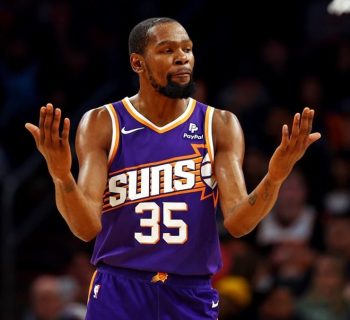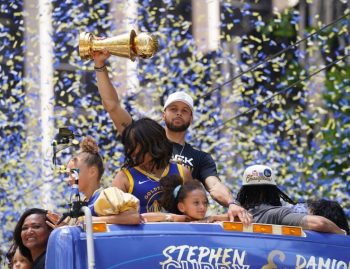NBA
NBA Daily: Raptors Desperately Need Serge Ibaka to Deliver

The Toronto Raptors are feeling the pressure as they dropped the first two games of their playoff matchup against the Cleveland Cavaliers. The Raptors have struggled against the Cavaliers in the past (to say the least) and the narrative is that star guards DeMar DeRozan and Kyle Lowry shrink in the postseason, that they over rely on isolation offense and are now, in some form or another, mentally compromised by the dominance of LeBron James. This encompasses part of Toronto’s past and current postseason problems. The biggest issue for Toronto right now, aside from the utter brilliance of James, is the disappearance of Serge Ibaka.
In the 2013-14 NBA season, Ibaka averaged 15.1 points, 8.8 rebounds, 2.7 blocks and one assists per game over 81 regular season games with the Oklahoma City Thunder. At this point in his career, Ibaka still wasn’t much of a three-point threat (only 0.7 three-point attempts per game). However, he was a defensive force, blocking multiple shots per game and making life difficult for any opponent who considered driving into the lane. He rebounded effectively, could switch onto the perimeter when necessary and was a game-changing player even when his offensive game wasn’t firing on all cylinders.
Unfortunately for the Raptors, that version of Ibaka hasn’t shown up so far against the Cavaliers. Even Ibaka’s most reliable offensive skill, which he didn’t have in his arsenal in the 2013-14 season, has disappeared – his spot up three-point shooting. So far this series, Ibaka is averaging 5.5 points, four rebounds, 1.5 assists and 0 blocks and is shooting 3-13 from the field.
Ibaka’s poor offensive production wouldn’t be such an issue if he was providing the sort of defensive impact he used to earlier in his career. However, Ibaka has failed to block a single shot in two games and hasn’t been able to shut down his individual opponents or provide any significant weak-side defensive help. While Ibaka may not put up the numbers he used to, it’s fair to expect him to have some positive impact in the postseason, especially when he is earning roughly $20 million this season and is guaranteed for even more than that in each of the next two seasons.
In Game 2, Raptors head coach Dwane Casey made the drastic move of pulling Ibaka out of the rotation, limiting him to just 12 minutes of action.
“Serge wasn’t having his usual game. He was struggling,” Casey said after Game 2. “Serge hasn’t been himself. I don’t know what it is.”
It’s not Ibaka’s fault that James went off, hitting multiple off-balance, fade-away jumpers over other defenders. But Ibaka shares the blame for not deterring the Cavaliers (mostly James) from attacking the rim or consistently stopping them once they get there. Knocking down threes and protecting the rim are the two essential skills Ibaka was supposed to provide Toronto but he’s been unable to do either through the first two games of the series.
“He’s our team member,” Casey added. “We’re going to support him, we’re going to push him, we’re going to try to make things easier for him instead of putting dirt on him and saying he’s dead.”
Ibaka is well aware of his current struggles and isn’t making excuses for it.
“I was just so disappointed in myself in that moment,” Ibaka said. “It’s one of those moments where you start thinking I just wish I can be out there playing my best game I can, like I’ve always done, to help my team. It just sucks, man. It sucks.”
Coach Casey mentioned changing the team’s lineup heading into Game 3. Perhaps moving Ibaka to the bench will in some way allow him to regroup, find different ways to impact the game and shake off what has been a less than stellar postseason. The Raptors would be thrilled to get at the very least a more sustained defensive effort from Ibaka, as well as some of his relatively consistent three-point shooting. Making himself a threat from beyond the arc could help soften what has been a surprisingly tight defense for Cleveland and could open up the lane for Lowry and DeRozan to attack the rim.
Jonas Valanciunas has provided a solid offensive presence in the lane, but he isn’t able to stretch the floor the way Ibaka can. Nor does Valanciunas have the defensive mobility that Ibaka has, which is needed when guarding a stretch big man like Kevin Love. Ibaka has the skill set to swing this series in favor of Toronto but, at this point, it’s not clear that he’s able to physically compete at the level he used to earlier in his career.
Toronto has put together an impressive season by emphasizing ball movement on offense, relying on its quality bench players and letting Lowry and DeRozan take over when necessary. The fact that James has hit his usual playoff peak levels is not Ibaka’s fault. But Ibaka needs to at least be playable for more than 12 minutes and provide the sort of production he was expected to when Toronto signed him to a three-year, roughly $65 million deal last summer. Toronto can still fight its way back into this series, but their chances of doing so rest heavily with Ibaka.













